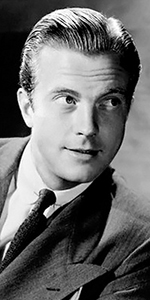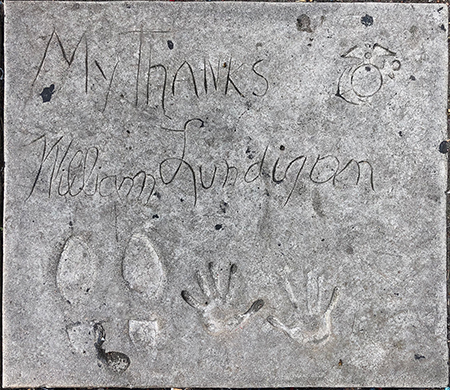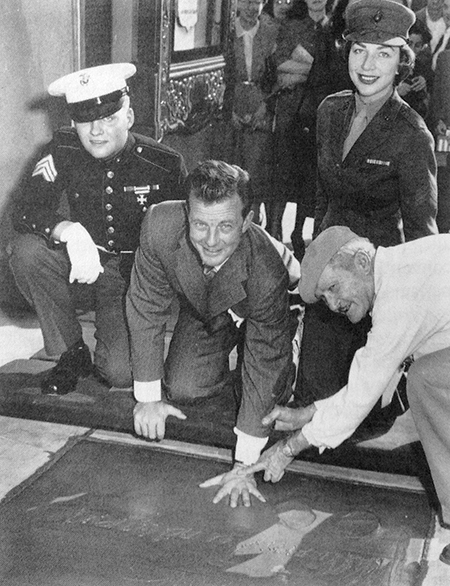 |
 |
 |
 |
 |
| William Lundigan, date unknown. |
| |
|
 |
|
 |
| |
| |
| |
| |
| |
| |
|
|
| William Lundigan |
 |
| Forecourt Ceremony held on Friday, December 29, 1950 |
| |
Born: June 12, 1914, in Syracuse, New York
Age at the time of the ceremony: 36
Died: December 20, 1975, in Duarte, California, age 61 |
| |
William Lundigan was a leading man popular in the late 1930s, 40s and into the 1950s. Tall, athletic and good looking, the smooth-voiced actor rose quickly through the ranks, but his career somewhat derailed with his serving in the Marines during World War II.
Lundigan was born to a family which owned a shoe store
in Syracuse New York. Young William worked in the store from an early age. The building was owned by Lundigan's father, who also rented space to pioneering CBS radio affilliate, WFBL, where William became fascinated by all things radio. He wrote and performed his own radio plays for his friends by age 16.
Graduating from the Nottingham High School, Lundigan attended Syracuse University, where he read law, played football, basketball and tennis. While there, William worked as an announcer, reading commercials at WFBL. Graduating with his law degree and having passed the New York state bar exam, the very new head of Universal Pictures, Charles R. Rogers, heard Lundigan's voice on the radio, thought Lundigan might have something, had him screen tested, and William was offered an acting contract at the studio in 1937.
Not really sure about this, he took a screen name of Russ Parker and got eighth-billing in his debut as one of the gang in Armored Car (released in June 1937). After playing bit parts in a number of Universal films, Lundigan played a supporting role in the Deanna Durbin picture Three Smart Girls Grow Up (released in March 1938).
Moving to Warner Bros., Lundigan had a role in the Errol Flynn western Dodge City (released in April 1939), and was in the Bette Davis weepie The Old Maid (released in September 1939). Re-teaming with Errol Flynn, he had a part in both The Sea Hawk (released in July 1940), and Santa Fe Trail (released in December 1940).
Lundigan actually headlined in A Shot in the Dark (released in April 1941), and had a large part with Ronald Reagan in International Squadron (released in August 1941). He had the lead in the Republic studio musical Sailors on Leave (released in September 1941), then joined up with Metro-Goldwyn-Mayer, first appearing with Wallace Beery in The Bugle Sounds (which played the Chinese in March 1942).
Lundigan's good looks and mellow voice made him perfect for being Mickey Rooney's friend, Jeff Willis in The Courtship of Andy Hardy (which played the Chinese in April 1942), and Andy Hardy's Double LIfe (played the Chinese in March 1943), and he even got into the Dr. Gillespie series, playing a double amputee in Dr. Gillespie's Criminal Case (played in October 1943). He helped Wallace Beery root out Japanese spies in the Phillipines in Salute to the Marines (played in September 1943).
Perhaps because of Salute to the Marines, some time after World War II broke out, Lundigan signed up with the Marines. M-G-M head Louis B.Mayer was very much put out by this; he knew that Lundigan could get out of serving due to an old football injury. M-G-M wanted to make him a big star during the war. But go to the war he would; he was assigned to the Signal Corps, where he filmed under combat conditions during the battles of both Pelepiu (mid-September to late November 1944) and Okinawa (early April to late June 1945), becoming a corporal in the process.
Returning from the war, his former boss at Universal, Charles S. Rogers, was producing The Fabulous Dorseys (released in February 1947) through United Artists; he gave Lundigan a part in the picture.
Lundigan freelanced for a bit, starring in Mystery in Mexico (released in August 1947) for director Robert Wise over at R-K-O, then signed a contract with 20th Century-Fox, starring as Jeanne Crain's love interest in Pinky (which played the Chinese in October 1949); it became the second-biggest grossing picture of the year. While at Fox, he starred in Mother Didn't Tell Me (which played the Chinese in March 1950), and left Robert Ryan to die in the 3-D flick Inferno (released in August 1953).
Lundigan is known today primarily for portraying astronauts during a time when no one knew what an astronaught might even be doing. Producer Ivan Tors signed Lundigan up for the lead in Riders to the Stars (released in January 1954), where he played a spaceship commander who would try to capture a meteor. His portrayal erriely presages the type of men would would be selected later to head the Mercury space program.
Lundigan had quite a career in television playing astronauts and the like: for the pilot of the syndicated Science Fiction Theatre in April 1955, Lundigan again portrayed a pilot who has a close call with a UFO — but no one will believe him. Why won't they believe him? For one season (yeah, but 38 episodes!!), Lundigan achieved a lasting fame for starring as Colonel Edward McCauley in the show Men Into Space in 1959-60 on CBS. Too bad The Twilight Zone sucked all the air out of the room that year.
He donned another sort of suit — a diving suit for The Underwater City (released in August 1962). Lundigan made a round of television shows before hanging it up in 1971: Death Valley Days in 1961, The Dick Powell Theatre in 1963, Run for Your Life in 1966, Medical Center in 1971, and Marcus Welby, M.D. in 1971.
Lundigan died of heart failure at Hope Medical Center (City of Hope) in 1975. He was only 61.
|
|
|
|
|
| |
 |
 |
| Grauman's Chinese Theatre, Hollywood, California. William Lundigan Forecourt block. Executed by Jean Klossner, Friday, December 29, 1950. 45 x 39 inches. |
 |
 |
 |
| Grauman's Chinese Theatre, Hollywood, California. William Lundigan Forecourt ceremony, Friday, December 29, 1950. Sergeant Homer S. Bramble, USMC, Corporal William Lundigan, USMC, and Segeant Gladys Bolkow, USMC, watch as cement artist Jean Klossner makes Lundigan's handprint. |
|
 |
|